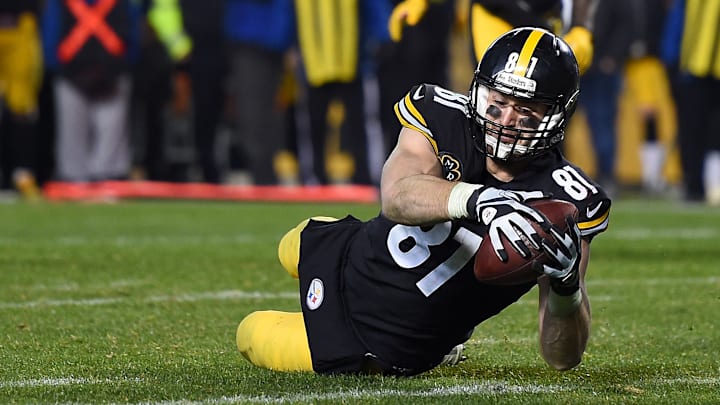It's a moment that immediately takes us back in time. The year was 2017, and the Pittsburgh Steelers were playing the New England Patriots on December 17th. With a win in this contest late in the season, Mike Tomlin's team would have had a chance to finish as the lone team atop the AFC. Then the most controversial play of the decade happened.
With just 34 seconds left in the game, Pittsburgh trailed New England by a score of 27 to 24, and a touchdown would win it. That's when Ben Roethlisberger found Jesse James over the middle of the field. The big tight end lunged over the goal line for what everyone believed to be the game-winning score.
Steelers fans were outraged when the touchdown on the field was overturned. After James had already crossed the plane of the endzone, the ball shifted ever so slightly in his hands when he hit the ground. This blown call by the officials not only cost Pittsburgh the game but also ultimately cost them the first seed in the AFC. That would belong to the Patriots (who went on to play in Super Bowl LII.
Surely by now, fans have had time to let their boiling blood come back down to a cool, right? But just the thought of this botched call gets us all riled up again. Recently, we asked artificial intelligence to weigh in on one of the most controversial calls the NFL has seen. Unfortunately, AI refused to say that 'Jesse James caught it.'
AI also didn't say that it wasn't a catch. Instead, it took the weak position of staying neutral on this controversial topic. Here's what Chat GPT had to say when asked if Jesse James actually caught this pass against the Patriots back in 2017:
"Opinions on whether it should have been ruled a touchdown vary among fans, players, and analysts. Many people disagreed with the ruling and believed that it should have been a touchdown, as James seemed to have possession of the ball long enough for it to be considered a catch under the circumstances.Chat CPT on Jesse James call
The controversy surrounding the play led the NFL to revise the catch rule in the subsequent seasons, aiming to clarify and simplify the criteria for what constitutes a catch. Under the revised rule, similar plays might have been ruled differently.
Ultimately, whether it was a touchdown or not depends on one's interpretation of the rules in place at the time and their personal perspective on the catch."
Chat GPT hints that, had the catch rule been in place and this play happened now, it would be ruled a catch. However, artificial intelligence apparently has the sense to steer clear of controversial matters like this.
What would have changed for Steelers if 'Jesse caught it'?
Pittsburgh Steelers fans will argue to the death that Jesse James caught the ball and scored a touchdown against the Patriots. The big follow-up question is: what would have happened next?
By the time the play ended, there would have been under 30 seconds for the Patriots to go the length of the field and score a touchdown. It's safe to assume that this would not have happened. From there, the Steelers went on to win their final two games of the 2017 regular season.
Ultimately, they tied the Patriots with a record of 13-3, but New England held the tiebreaker. If the only thing that changed was this catch ruling, the Steelers would have finished 14-2 as the lone number-one seed in the AFC.
While Pittsburgh had a bye either way, they wouldn't have put up a dud against the Jacksonville Jaguars in the divisional round ( who were the third seed that year). Instead, the Steelers would have hosted the Tennessee Titans -- a game that New England went on to win 35-14 against the fifth seed.
Assuming they won this contest, Pittsburgh would have played the winner of Jacksonville and New England for the AFC Championship Game, so this still wouldn't have been a cakewalk to the Super Bowl. The Eagles would then have been their Super Bowl opponent if they advanced.
More likely than not, the Steelers weren't winning a Super Bowl following the 2017 season, but you never know how things could have turned out if one play (like the Jesse James no-catch call) would have gone the other way. Regardless, it's time to put this in the past and look forward to what's ahead.
